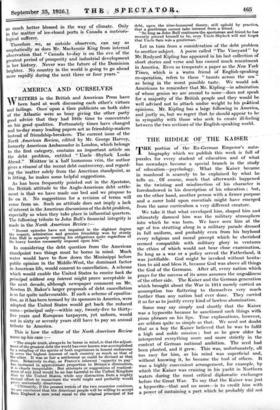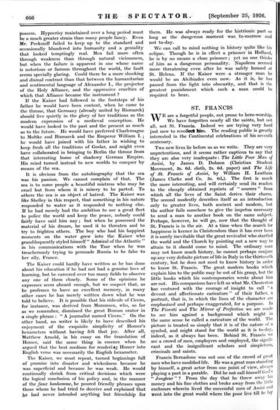THE RIDDLE OF THE KAISER - portion – of the -Ex-German
Emperor's auto- biography which we publish this week is full of puzzles for every student of education and of what has nowadays become a special branch in the study of education—psychology. What the Kaiser became in manhood is scarcely to be explained by what he tells us.. Of Rourse, much that afterwards happened in the twisting and misdirection of his character is foreshadowed in his description of his education ; but, on the other hand, another person with a firmer purpose and a surer hold upon essentials might- have emerged from the same curriculum a very different creature.
We take it that what enveloped him, shaped him and ultimately damned him was the military atmosphere into which he was born. We have seen him at the age of ten strutting along in a military parade dressed in full uniform, and probably even from his boyhood every religious and moral precept which he cherished seemed compatible with military glory in ventures the ethics of which would not bear close examination. So long as a war or a policy served the Fatherland, it was justifiable. God might be invoked without hesita- tion to aid and bless it, because God was above all things the God of the Germans. After all, every nation which prays for the success of its arms assumes the ungodliness of the other side. The Kaiser and the German generation which brought about the War in 1914 merely carried an assumption too flattering to themselves very much further than any nation had ever done. They carried it so far as to justify every kind of lawless abomination.
Some may say simply and shortly that the Kaiset was a hypocrite because he sanctioned such things with pious phrases on his lips. True explanations, however, are seldom quite so simple as that. We need not doubt that as a boy the Kaiser believed that he was to fulfil a high and noble mission ; but as he grew older he interpreted everything more and more strictly in the context of German national ambition. The seed had been planted, and it grew. This was, unfortunately, all too easy for him, as his mind was superficial and, without knowing it, he became the tool of others. It was a highly convenient arrangement, for example, by which the Kaiser was cruising in his yacht in Northern waters during the most critical diplomatic exchanges before the Great War. To say that the Kaiser was just a hypocrite—that and no more—is to credit him with a power of sustaining_ a part which he probably did not possess. Hypocrisy maintained over a long period must be a much greater strain than many people fancy. Even Mr. Pecksniff failed to keep up to the standard and occasionally blundered into humanity and a geniality that looked temptingly real. Men fail more often through weakness than through natural viciousness, but when the failure is apparent in one whose name is notorious or famous throughout the world, the fault seems specially glaring. Could there be a more shocking and dismal contrast than that between the humanitarian and sentimental language of Alexander I., the projector of the Holy Alliance, and the oppressive cruelties of which that Alliance -became the instrument ?
If the Kaiser had followed in the footsteps of his father he would have been content, when he came to the throne, that Germany (already united by Bismarck) should live quietly in the glory of her traditions as the modern expression of a medieval conception. He would have looked to the past and the present as much as to the future. He would have preferred Charlemagne to Moltke and Bismarck and the Emperor William I.; he would have joined with his father in wishing to keep fresh all the traditions of Goslar, and might even have collaborated in bringing to Berlin the throne from that interesting home of shadowy German Empire. His mind turned instead to new worlds to conquer by means of the sea.
It is obvious from the autobiography that the sea was his passion. We cannot complain of that. The sea is to some people a beautiful mistress who may be cruel but from whom it is misery to be parted. To others the sea is an object of hatred. The Kaiser was like Shelley in this respect, that something in his nature responded to water as it responded to nothing else. If he had merely had the ambition to use a great fleet to police the world and keep the peace, nobody could fairly have said him nay ; but when he possessed the material of his dream, he used it to threaten and to try to frighten others. The boy who had his happiest moments on the water grew into the Kaiser who grandiloquently styled himself" Admiral of the Atlantic" in his communications with the Tsar when he was treacherously trying to persuade Russia to be false to her ally, France.
The Kaiser could hardly have written as he has done about his education if he had not had a genuine love of learning, but he careered over too many fields to observe any one of them closely. Some of the opinions he expresses seem absurd enough, but we suspect that, as he professes to have an excellent memory, in many other cases he has merely written down what he was told to believe. It is possible that his ridicule of Cicero, for instance, was derived from Mommsen, who, so far as we remember, dismissed the great Roman orator in a single phrase : "A journalist named Cicero." On the other hand, no writer is likely to have described his enjoyment of the exquisite simplicity of Homer's hexameters without having felt that joy. After all, Matthew Arnold, in his essay on the translation of Homer, said the same thing in essence when he argued that the best medium for renderbzg Homer into English verse was necessarily the English hexameter.
The Kaiser, we must repeat, turned beginnings full of promise into disaster and wickedness because he was superficial and because he was weak. He would continually shrink from critical decisions which were the logical conclusion of his policy and, in the manner of the faux bonhomme, he poured friendly phrases upon those whom he had tried to deceive and explained that be had never intended anything but friendship for them. He was always ready for the histrionic part so long as the dangerous moment was to-morrow and not to-day.
We can call to mind nothing in history quite like his eclipse. Though he is in effect a prisoner in Holland, he is by no means a close prisoner ; yet no one thinks of hizn as a dangerous personality. Napoleon :seemed more threatening even after he was safely housed at St. Helena. If the Kaiser were .a stronger man he would' be an Alcibiades even now As it is, he has passed from the light into obscurity, and that is the greatest punishment which such • a man could be required to bear.















































 Previous page
Previous page